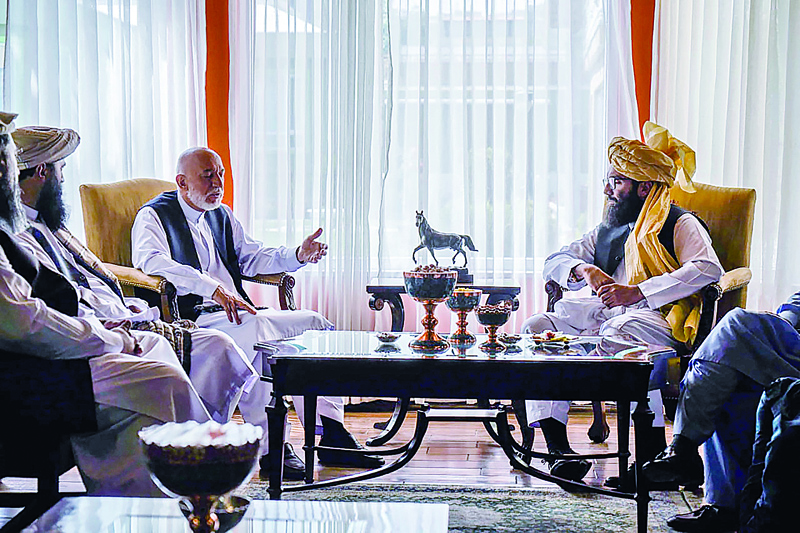 This handout photo released by the Arabic Twitter account of the "Islamic Emirate of Afghanistan" yesterday shows a Taleban delegation led by the head of the negotiating team Anas Haqqani (C-R) meeting with former Afghan government officials including former president Hamid Karzai (C-L) at an unspecified location in Afghanistan. - AFP
This handout photo released by the Arabic Twitter account of the "Islamic Emirate of Afghanistan" yesterday shows a Taleban delegation led by the head of the negotiating team Anas Haqqani (C-R) meeting with former Afghan government officials including former president Hamid Karzai (C-L) at an unspecified location in Afghanistan. - AFP
KABUL: Defiant protesters waved Afghan flags at scattered rallies yesterday to mark the country's independence anniversary, as the son of the nation's most famous resistance fighter vowed to take up arms against the newly returned Taleban regime. Tens of thousands of people have tried to flee Afghanistan since the hardline Islamist militants swept into the capital on Sunday, completing a stunning rout of government forces after a two decade insurgency. Taleban leaders have repeatedly vowed not to take revenge against their opponents, while seeking to project an image of tolerance.
But memories of the Taleban's brutal regime of the 1990s-which saw music and television banned, people stoned to death and women confined to their homes-have caused panic about what lies ahead for Afghans. In the capital Kabul, a group of men and women unfurled the black, red and green tricolour national flag on the country's independence anniversary. Social media also showed a crowd cheering a man shimmying up a pole in another neighbourhood, before tying the flag at the top.
But the Taleban-who have raised their own black and white standard over government buildings-have already signalled they will not stand for any challenges, breaking up a flag-waving rally in Jalalabad on Wednesday with gunfire. Stronger signs of defiance were also starting to emerge. Ahmad Massoud, the son of Afghanistan's most famed anti-Taleban fighter, yesterday said he was "ready to follow in his father's footsteps", as he rallied his forces in the Panjshir Valley northeast of Kabul-the country's last holdout.
"The Taleban doesn't control the whole territory of Afghanistan," Russian Foreign Minister Sergei Lavrov told reporters of Massoud's resistance. Massoud is the son of Ahmed Shah Massoud, the famed anti-Soviet and anti-Taleban resistance leader assassinated in 2001, two days before the September 11 attacks on the US.
A situation worse than death'
The United States, meanwhile said the militants were reneging on pledges to allow Afghans who worked with foreign governments out of the country. "We have seen reports that the Taleban... are blocking Afghans who wish to leave the country from reaching the airport," Deputy Secretary of State Wendy Sherman told reporters.
She added that "all American citizens, all third-country nationals and all Afghans who wish to leave" should be able to do so without harassment. "I am desperate to leave, I have bad memories of their regime," a 30-year-old who worked for a foreign NGO and tried but failed to reach Kabul airport told AFP. Unconfirmed reports on social media say several people have been killed as US forces and the Taleban-separated by an unofficial no-man's land-struggle to contain the desperate throngs of people trying to get on flights out of Kabul.
"I went to the airport with my kids and family... the Taleban and Americans were shooting," said one man who until recently had worked for a foreign NGO. "Despite that (the shooting) people were moving forward just because they knew a situation worse than death awaited them outside the airport." The United States said it has airlifted out nearly 5,000 US citizens and Afghans, while France, Britain and other nations have also organised evacuation flights.
'The system has changed'
Taleban spokesman Zabihullah Mujahid has said the new regime would be "positively different" from their 1996-2001 stint. But the rebrand was hard to believe for many, with women largely staying off the streets, and journalists-and those who have worked with Western governments and organisations-saying they are terrified. Their rule then was infamous for an ultra-strict interpretation of sharia law, featuring deaths by stoning, girls being banned from school and women from working in contact with men.
Yesterday, an Afghan woman journalist made a desperate social media plea after she was barred from entering the TV station where she worked. "The male employees... were allowed to enter the office, but I was told that I couldn't continue my duty because the system has been changed," news anchor Shabnam Dawran said, adding that "our lives are under threat".
The United States ultimately led the invasion of Afghanistan to topple the Taleban because they continued to provide sanctuary for Al-Qaeda after the September 11 attacks. The Taleban have continued to edge towards establishing a government, with co-founder Mullah Abdul Ghani Baradar returning from exile and other senior figures meeting ex-president Hamid Karzai and other former government officials.
Yesterday the Taleban acknowledged the nation's independence day recalling the defeat of the British empire in three wars as well as the Russians following their decade-long occupation that ended in 1989. "It is a matter of great pride for Afghans that their country is on the verge of independence from the American occupation today," a spokesman tweeted. - AFP




